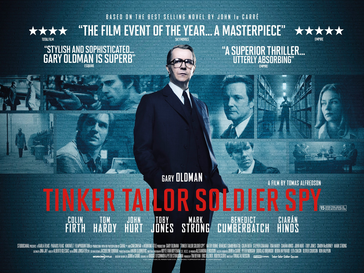Amidst the tension-filled era of the Cold War, Jim Prideaux (Mark Strong) is sent to Budapest to resolve a delicate issue. He is to meet with a Hungarian general who possesses the name of a mole the Russians have planted in the secret British Intelligence Service (code name “The Circus” – the SIS became commonly referred to as Military Intelligence 6, or MI6, during WWII), believed to be in a top position for years. The operation ends in disaster, with Prideaux shot and chief agents Control (John Hurt) and George Smiley (Gary Oldman) forced into retirement over the blunder.
A year later in 1973, Control dies. Permanent Undersecretary Oliver Lacon (Simon McBurney), a civil servant in charge of intelligence, recruits dismissed Deputy Chief Smiley to continue the hunt for the traitor. His initial suspicions are with Director of Operations Percy Alleline (Toby Jones) and Circus Officer Toby Esterhase (David Dencik), who gain political favor with the U.S. through Operation Witchcraft, which trades Soviet intelligence for American materials. As Smiley begins to investigate, aided by young protégé and head of the Scalphunters (field agents) division Peter Guillam (Benedict Cumberbatch), he comes across a bevy of cagey characters, including possible defector Ricki Tarr (Tom Hardy), with clues about the double agent supplied by a female informant, Irina (Svetlana Khodchenkova), researcher Connie Sachs, who accused high-ranking officials of conspiring with Polyakov, a suspected Soviet agent, and finally a duty clerk with information exposing the lies of Bill Haydon (Colin Firth), a well-liked, upper-circle officer of the Circus.
“Trust no one,” states Control. There is a palpable paranoia presiding over everyone. Shifty eyes try to feel out the surroundings, each agent exhibits cautiousness, and all parties appear overly concerned with what might turn up in investigations. This is compounded as the members of the Circus are scrutinized more than the “real” enemies from outside England. Fakeness permeates them all as they try to cover their tracks and conceal intel, or leak it for protection or power. The search for weaknesses, realizing the lack of moral worth and identifying unscrupulousness on every side of intelligence gathering, however, is a slow, complicated, confusing process (narrated by melancholy trumpets and woeful clarinets). Things happen, but their significance is not immediately revealed. Although most pieces are eventually explained, watching it all unfold is baffling – this film certainly does not demonstrate a direct method of coming to a conclusion. Those unfamiliar with the novel by John le Carre will likely be lost throughout much of the covert dealings.
The cast is astounding, amassing a record assortment of popular British actors. But the large cast brings a lot of roles that makes sorting out personnel and code names even more bedeviling. On top of that is a complex mishmash of spy speak, governmental terms, monikers that are never associated with a face, and spoken foreign languages that require subtitles. There are also constant flashbacks – and not the lengthy, explanatory kind, but the short, choppy ones that reveal brief clues, end abruptly and begin again with little warning. Since the time frame is within a year, there isn’t even aging, location changes or differences in cinematographic colors to aid the viewer in deciphering the switches. Blink and it might be missed. Reaching the final climactic disclosure is tricky and cryptic at best, but the resolution has a certain satisfactory note to it, primarily thanks to a cheery song called “La Mer” that plays in the background as each remaining character drifts back to an undeniably copacetic place of contentment.

